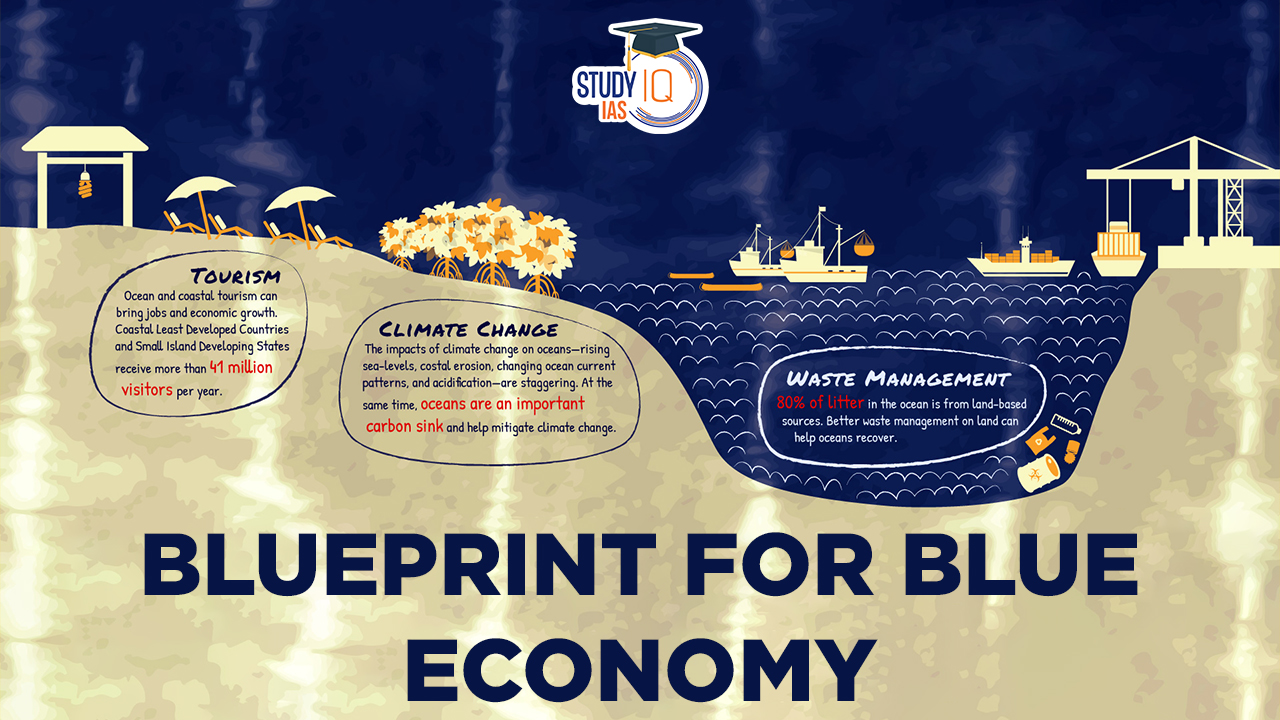Table of Contents
Context: India’s CAG aims to help create a framework for G20 nations to ensure inter-generational equity and mitigate climate change while developing ocean resources as a Chair of SAI20.
More on News
- The Comptroller & Auditor General of India (CAG) will chair SAI20, the Engagement Group for Supreme Audit Institutions (SAls) of G20 countries in Goa in June 2023. One of the key priority areas for deliberations is Blue Economy.
- The event will see the participation of the Supreme Audit Institutions (SAIs) of Australia, Brazil, Egypt, Indonesia, Oman, the Republic of Korea, Russia, Saudi Arabia, Turkey, and the United Arab Emirates.
Comptroller and Auditor General
- Comptroller and Auditor General is an important constitutional body that ensures government accountability in India.
- Article 148 of the Constitution provides for a CAG with the status of a Supreme Court judge.
- Constitutionally, it has been mandated to enhance the accountability of the Executive to the Parliament and State legislatures by carrying out audits in the public sector.
What is Blue Economy?
- The World Bank defines “blue economy” as “sustainable use of ocean resources for economic growth, improved livelihoods and jobs, while preserving the health of the ocean ecosystem”.
- Activities: Seafood harvesting (fishing and aquaculture), extraction and use of marine non-living resources (such as minerals and oil and gas), generation of renewable energy (such as offshore wind), and commerce and trade are examples of activities that could count towards a blue economy.
- 14th SDG Goal: Developing a blue economy is also linked to the 14th Sustainable Development Goal.
- It aims to protect “life below water”, which involves the conservation and sustainable use of the oceans, seas and marine resources for development.
- Sustainable Blue Economy Finance Principles: In 2018, the United Nations Environment Programme (UNEP) had laid out the Sustainable Blue Economy Finance Principles.
- It is a framework that investors can use to fund ocean-based industries.
- Financiers can use it as a reference point to see how marine investment can impact livelihood and poverty eradication.
- Global Biodiversity Framework: Targets set out in the Global Biodiversity Framework of COP15 focus on reducing the rate of loss of biodiversity, ensuring the fair and equitable sharing of benefits arising from the use of genetic resources, and restoring degraded ecosystems. It serves as a blueprint for countries to work together and make progress in addressing the global biodiversity crisis.
- Need for Accounting Framework for blue economy:
- The blue economy encompasses an array of coastal activities, including fishing and tourism. Measurement of Blue Economy is challenging due to conflicting definitions and issues while classifying different sectors and sub-sectors.
- Existing international economic classifications are unable to properly differentiate between land-based and ocean-based activities, and even the System of National Accounts (NAS) does not provide a clear understanding of the blue economy.
- Hence, a new accounting framework is needed that can objectively identify production, trade, and services related to the various segments of the blue economy.

Environmental Auditing in India
- India Prioritizing Blue Economy: India has marked the blue economy as one of the 10 core sectors for national growth and a National Blue Economy Policy aims to harness maritime resources while preserving the country’s rich marine biodiversity.
- Role of CAG in Environmental Auditing: CAG has been aiming to improve audits performance and compliance concerning state finances, local governance and environmental auditing.
- National Accounting Framework: Setting compliance standards and a national accounting framework for the blue economy is a long-term priority for the CAG.
- Important Reports by CAG: In 2022, CAG released the first-ever country-wide Compendium of Asset Accounts of Natural Resources, prepared in line with the UN system of Environmental and Economic Accounts. This handbook is a guide for the government to utilise natural resources optimally.
- Significance of Environmental Auditing:
- The Supreme Audit Institutions have an important role to play in the global efforts of the United Nations targets for SDG-14, of reversing the declining health of the oceans and developing strategies and devising ways to enhance the contribution of blue economy in the national economy.
- The audit helps in understanding the efficiency of development drivers such as project clearances, construction activity, institutional capacity to curb land and forest violations, community livelihood support mechanisms, as well as mitigation management plans to conserve biodiversities such as mangroves and near-shore coral reefs.
- There needs to be development of disaster-resilient infrastructure along coasts that can withstand the impacts of hurricanes, typhoons, and tsunamis.
- The development of disaster-resilient infrastructure has implications for the auditing community, as auditors are responsible for ensuring that organizations comply with relevant regulations and standards.
India Advocating Blue Economy in its G20 Presidency
- Toolkit for audit: The toolkits being prepared by SAI20 under the leadership of the CAG of India will be presented at the SAI20 Engagement Group meet.
- This will provide a unique opportunity for constructive dialogue and agreement to improve auditing of performance in specific areas of ocean-based activities.
- This collaborative effort would build capacity of auditors across SAI20 member countries initially.
- Other Initiatives by India: The theme of India’s G20 Presidency is “Vasudhaiva Kutumbakam” or “One Earth. One Family. One Future”. This theme facilitates India’s commitment towards green development, circular economy and lifestyle behaviour changes as an actionable plan for achieving the 2030 Sustainable Development Goals.
-
- The First G20 Environment and Climate Sustainability Working Group has identified the blue economy as a key priority.
- The aim is to promote adoption of high-level principles that guide sustainable and equitable economic development through the ocean and its resources, while simultaneously addressing climate change and other environmental challenges.
- G20 presents an opportunity to foster collaborations for advancements in science and technology, promote public-private partnerships, and create novel blue finance mechanisms.
- India’s has active involvement in international and regional dialogues on the Blue Economy, maritime and marine cooperation.
-
G20 Initiatives for Blue Economy
- G20 Action Plan on Marine Litter: It promotes the socio-economic benefits of establishing policies to prevent marine litter.
- Osaka Blue Ocean Vision: It aims to reduce additional pollution by marine plastic litter to zero by 2050.
- Coral Research and Development Accelerator Platform: It advances research, innovation and capacity building in all facets of coral reef conservation, restoration and adaptation.
Challenges in Blue Economy
- Extreme Weather: Blue economies are being threatened by intensifying extreme weather events, ocean acidification, and sea level rise.
- Unplanned Urbanisation: Growing marine pollution, over-extraction of resources and unplanned urbanisation also pose significant threats to the ocean, coastal and marine ecosystems, and biodiversity.
- Lack of Capacity: Many developing nations have high levels of external debt. Lack of capacity and technology for transition between the Agri economy and marine economy is also a critical hindrance.
- Lack of Guiding Principle: There is concern that without the elaboration of specific principles or guidance, national blue economies, or sustainable ocean economies, economic growth will be pursued with little attention paid to environmental sustainability and social equity.
- Lack of Collaboration: Achieving this goal of blue economy would need tremendous human effort, and would call for global cooperation through various legal and institutional frameworks.
- It is also imperative to involve the civil society, fishing communities, indigenous people and communities for an inclusive discussion.
India’s Initiatives for Blue Economy
- Pradhan Mantri Matsya Sampada Yojana: The Union Government had launched the Pradhan Mantri Matsya Sampada Yojana in 2020 for sustainable development of India’s fisheries sector with an estimated investment of Rs 20,000 crore over the next five years.
- Draft Blue Economy Policy: It envisages optimal utilisation of all sectors of the maritime domain, from living and non-living resources to tourism and ocean energy for sustainable development of coastal areas. The 7 key areas are (refer image):

- Sagarmala Initiative: A Union Government’s initiative that aims to promote port-led direct and indirect development and provide infrastructure to transport goods to and from ports quickly, efficiently and cost-effectively.

- Fisheries and Aquaculture Infrastructure Development Fund (FIDF): It was launched by the Union Government in 2018 with a total fund size of Rs 7522.48 crore, with the aims to achieve a sustainable growth of 8-9%.
- Deep Ocean Mission: This Mission of the Union Government emphasizes on development of deep-sea technology for deep sea mining, exploration of deep-sea minerals resources and marine biodiversity.
- Coastal Regulation Zone Notification: India adopted the Coastal Regulation Zone notification to classify and better manage coastal regions and conserve ecologically sensitive coastal and marine areas including ecosystems.
Way Forward
- India’s position as G20 president is also an opportunity to advocate for the global south, where many ocean-dependent communities are vulnerable.
- It is an opportunity for India to ensure environmental sustainability, while providing for social equity and green economy.


 India’s Road Safety Crisis: Engineerin...
India’s Road Safety Crisis: Engineerin...
 A Decade of Startup India: Transforming ...
A Decade of Startup India: Transforming ...
 Berkeley Earth Annual Temperature Report...
Berkeley Earth Annual Temperature Report...

























